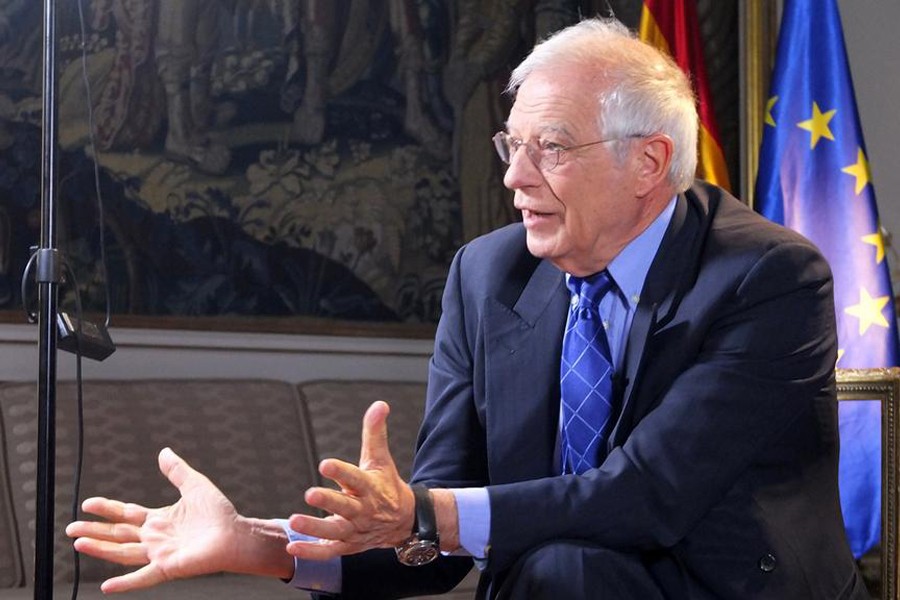High Representative of the European Union Josep Borrell has said the Indo-Pacific region is the future, but insecurity and tensions are rising, threatening the order and balance of this dynamic region.
"The key point to make here is that the economic growth of this region rests on openness, on stable and shared rules, and shared security," he said.
The High Representative for the EU Foreign Affairs and Security Policy made the remarks while sharing the EU approach to the Indo-Pacific at the Centre for Strategic and International Studies (CSIS), reports UNB.
Borrell said this is a dynamic region and it is as much a strategic space as a geographical reality, which they define as stretching from East Africa to the Pacific Island States.
"It's becoming the world's centre of gravity, both in geo-economic and geo-political terms," he said.
The EU is the top investor and development assistance provider for the Indo-Pacific and one of its biggest trading partners.
The Indo-Pacific creates 60 per cent of global GDP and two-thirds of global growth. It is the second largest destination for EU exports; and home to four out of the top ten EU trading partners, according to the European Union.
By 2030, the overwhelming majority (90 per cent) of the 2.4 billion new members of the middle class will come from this region, it said.
However, Borrell said, amid all this dynamism, the regional stability is increasingly challenged: maritime and land disputes, internal crises and conflicts, and the US-China geo-political competition is intensifying.
"We see the consequences around the world, but most sharply in this region. A clear sign is the strong regional military build-up," he said.
The Indo-Pacific's share of global military spending increased from 20 per cent in 2009 to 28 per cent in 2019 and is rising further, Borrell said.
"That means countries in this region are investing heavily in their militaries, as they aren't sure what the future holds. It's a sign of a worsening regional security landscape," said Borrell.
A research Institute in Singapore recently asked opinion-leaders and policy-makers in Southeast Asia who would be their most favoured and trusted strategic partner. Four in 10 of the respondents picked the EU.
EU & COVAX
Borrell said they favour vaccine multilateralism and believe that COVAX is the best way to ensure the access to vaccines by low and middle-income partner countries in this region.
"We put our money where our mouth is, and the EU is now the second largest contributor to COVAX with over EUR 2.4 billion," he said.
In addition, Borrell said they are the world's largest exporter of vaccines. "With over 240 million doses, we have exported around half of our production to 90 countries."
He said the "EU Digital COVID Certificate" that the EU is working on will not be exclusive or build barriers. "It's mainly regulating and allowing inside-EU travel."
In their efforts to globally fight the pandemic, Borrell said they deliberately chose a different path from others.
"We do not offer preferential treatment, nor do we seek political favours in return. Instead, we look for concrete cooperation, including with ASEAN."
EU's Indo-Pacific strategy
The EU wants to expand engagement with this region, which is why the 27 EU Foreign Ministers recently adopted a new EU Strategy for Cooperation in the Indo-Pacific, after several EU member states had already done so at national level.
The basic message is that the EU will work with its partners in the Indo-Pacific to respond to emerging dynamics that are affecting regional stability, said Borrell.
"Our approach is by the way very close to ASEAN's own Outlook on the Indo-Pacific."
Concretely, he said, they will advance joint work to boost trade and investment, economic openness and a sustainable approach to connectivity.
The EU will promote multilateral cooperation, working on global challenges, from the pandemic to climate, from ocean governance to digital.
"And we will deepen our security engagement, seeking to make that cooperation as concrete as possible," said Borrell.
He said their new strategy aims to deepen regional integration and is inclusive for all partners in the region, wishing to cooperate with the EU when our interests coincide.
"This includes China because we know that in important areas, like climate, fisheries and biodiversity, its cooperation is essential," said Borrell.
He said they do not aim to create rival blocs or force countries to take sides, and want to deepen our cooperation with democratic, like-minded partners.
"The European Union's commitment to democratic rights and fundamental freedoms is very strong. Not because we see these as European or Western constructs. But because these values and principles are universal," he said.


